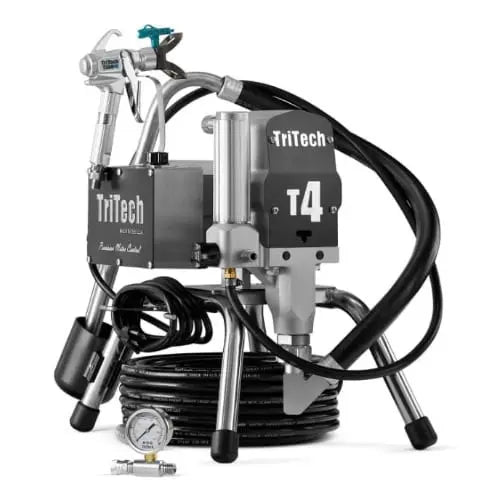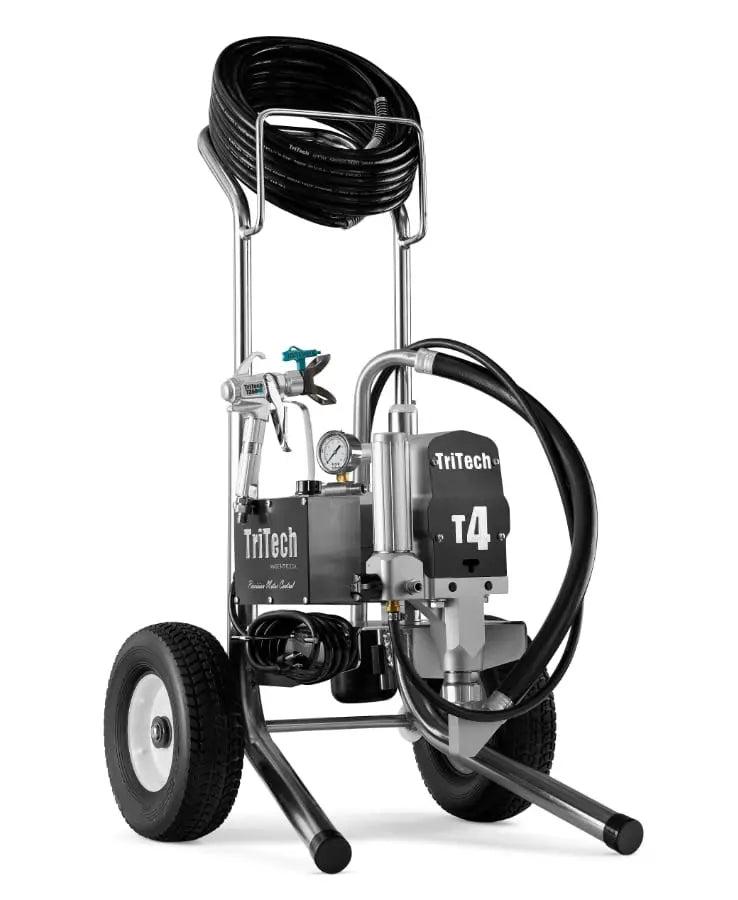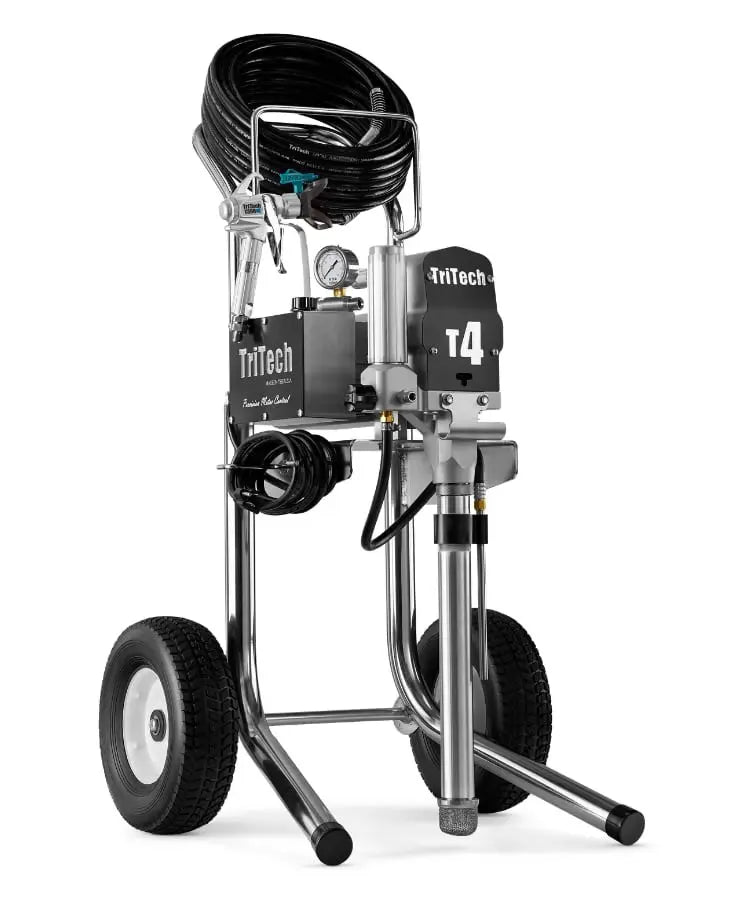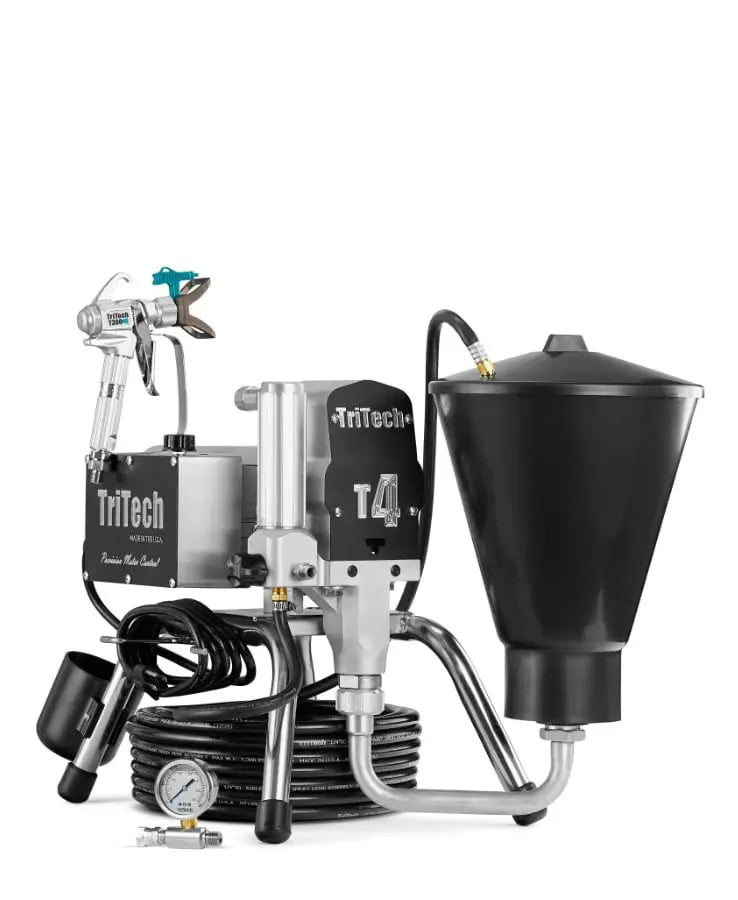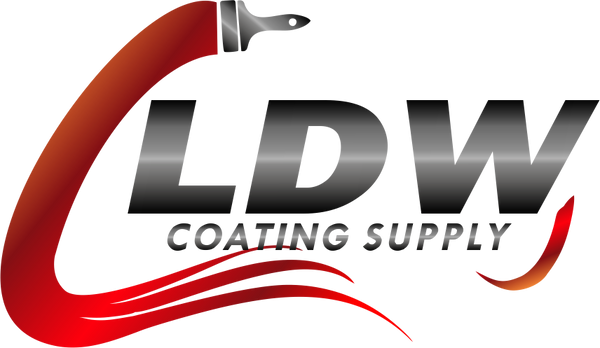LDW Coating Supply
TriTech T4
TriTech T4
Couldn't load pickup availability
T4 PRODUCT OVERVIEW
- Precision Motor Control. PMC matches the motor speed to the pressure and tip size selected.
- No pulsation at any pressure with any size tip.
- Balanced fluid manifold
- No cylinder to wear out
- Lightweight, easy to carry
- Built for professional use
- All metal construction
-
Max Pressure
3300 PSI (226 BAR)
Max Tip Size
.023
Max GPM
.57 (2.17 LPM)
Motor HP
1,1 HP
Sound
87dBa
Maintenance
Maintenance
Airless Sprayer Protector
TriTector airless spray system barrier is chemically engineered with POWER3 to clean, lubricate and protect your spray system. It gives you the power you need to extend the life of your system against the harsh agents in today’s latex coatings as well as solvent based coatings. The POWER3 formula keeps foreign materials in suspension in between uses – ready to flush out quickly before your next job.
TriTector is a water-based product, so fire hazards during clean-up are eliminated and you don’t have to be concerned about disposal problems associated with solvent-based products on the market.
TriTector’s POWER3 formula provides the same benefits for other water-based pumping systems including pressure washers, chemical sprayers, liquid sand blast machines and water based material applicators.
Airless Sprayer Lubricant
TriLube airless spray system lubricant is chemically engineered to lubricate, protect and clean your spray system. It dissolves material on displacement rods and reduces premature wear on cylinders, rods, packings and seals from dried pigment particles.
TriLube’s POWER3 formula mixes readily with solvents and thinners, evaporates slowly and is flame resistant. Other oils are NOT SUBSTITUTES for TriLube.
DIRECTIONS FOR USE
- Portable Pumps: Fill wet cup 1/2 full so that TriLube can be wiped out if unit is to be tipped during use and transportation.
- Fixed Pumps: Fill wet cup 2/3 full. Remove TriLube only if saturated and thick with material pumped past the seals.
CAUTION
TriLube should not be used in pumps with rubber packings, in-line oilers or air motors. Test for compatibility with all coatings.
Safety
Safety
AIRLESS SPRAY EQUIPMENT SAFETY
Airless spray equipment is an important tool for the professional painter. But as with any tool, following safety guidelines is part of knowing how to use it. Be sure that you and all members of your crew that will HAVE ANY CONTACT AT ALL with a paint sprayer understand and follow safety and operating instructions.
DO NOT EXCEED THE MAXIMUM WORKING PRESSURE ON ALL COMPONENETS ON YOUR SPRAY EQUIPMENT!
High pressure fluid from spray or leaks can penetrate the skin. If not promptly and properly treated, the injury can cause permanent disability or amputation. If you are injected, see a physician immediately. Do not treat as a simple cut.
Always use a tip safety guard for added protection against injection. The tip guard provides protection against injection, but does not prevent it. Never cut off tip guard! Always engage gun safety lock when the gun is not in operation. Before servicing unit, consult owners manual and observe all warnings.
Never attempt to install, change or clean tip or safety guard without first doing the following:
- Set trigger safety in a locked position.
- Shut off sprayer and in addition, unplug electrical cord or air supply.
- Release fluid pressure from the entire system, from pump to spray gun tip.
If you have been injected or injured – or even think you have been.
DO NOT WAIT! DO THE FOLLOWING IMMEDIATELY:
- Go to the nearest emergency room or medical center IMMEDIATELY.
- Inform the physician and all medical staff that you suspect a high pressure injection injury.
- Provide the medical information below and any medical information provided with your equipment to the medical staff and physician.
- Provide as much detail as possible regarding the paint(s) or coating(s) involved in your injury.
CRITICAL INFORMATION FOR ALL MEDICAL PERSONNEL:
Injection in the skin is a serious traumatic injury. IT IS IMPORTANT TO TREAT THE INJURY SURGICALLY AS SOON AS POSSIBLE. Do not delay treatment to research toxicity. Toxicity is a concern with some exotic coatings injected directly into the bloodstream.
Consultation with a plastic surgeon or a reconstructive hand surgeon may be advisable.
The seriousness of the wound depends on where the injury is on the body, whether the substance hit something on its way in and deflected causing more damage, and many other variables including skin microflora residing in the paint or gun which are blasted into the wound. If the injected paint contains acrylic latex and titanium dioxide that damage the tissue’s resistance to infection, bacterial growth will flourish. The treatment that physicians recommend for an injection injury to the hand includes immediate decompression of the closed vascular compartments of the hand to release the underlying tissue distended by the injected paint, judicious wound debridement, and immediate antibiotic treatment.
